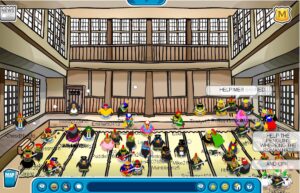Roleplay has been an ever-present aspect of the army community. As armies have evolved over the past decade, the extent to which roleplay is utilized has varied. It is my opinion that armies have strayed too far from the core value of roleplay, and should adopt more traditional ways of army warfare.

In the early years of the Club Penguin army community, the landscape looked a lot different than what we have now. Armies originally formed as small in-game clans, often organized by color, and would claim ownership of various servers. The aspect of armies evolved from snowball fights between various “clans”. Soon after, the first real examples of military roleplay began to develop. World War II, also known as the Clan Wars, was the first real war between established armies. Armies began to organize themselves on third-party websites such as Miniclip Forums, which led to the development of organized patrols and ranks. Leaders of the Army of Club Penguin, Romans, and the Underground Mafias Army would convey tactics and orders in-game. Battles developed organically and spontaneously, rather than having orders relayed through a chatroom. I believe that a return to a more fluid style of gameplay would be beneficial for the army community.

World War II, Clan Wars
Recruiting
Many people don’t know that I was recruited through in-game roleplay. After not playing Club Penguin for years, I had heard about the creation of Club Penguin Rewritten. I logged on and went to the iceberg, where I saw groups of penguins throwing snowballs at each other. One group, holding mops and buckets, was throwing snowballs at a group of purple penguins. Both sides were shouting orders at their groups, saying to retreat, calling for medics, and lining up to form barriers. I had never seen anything like it before. I swiftly turned teal and equipped my mop bucket item, joining an army now remembered as Mopia. The purple penguins retreated to the leader’s igloo and I followed. After a conversation with the penguin in charge, I switched sides and joined the Recon Federation. For a week I logged on and waited for the purple penguins. Eventually, I received a promotion in-game to high command, and that’s when I discovered the website and decided to join officially.

Mopia event [2019]
Many developers, such as Amman from Club Penguin Journey [CPJ], are not okay with direct advertisement in game. CPJ staff encourages attracting users through events and offering them information only if they ask. In my experience as an army leader, my strongest recruits have always come from a CPPS. Roleplaying is a much more sustainable and effective way of bringing new members into army servers, and doing so remains respectful to CPPS staff members. Not only is roleplay a fun way to keep members interested in your army, but doing something fun reduces burnout and helps troops create friendships. Additionally, implementing in-game ranks and responsibilities creates more of an incentive for troops to log on.

ACP event on CPJ with spectators
Engagement
Unlike the battles we conduct today, conflicts between armies were predominantly roleplayed. Specific responsibilities for soldier ranks, or tactical retreats to different rooms in an effort to regroup, were among the many reasons why armies became so engaging. As described on many occasions by ACP founder Oagalthorp in his ACP Saga, the roleplaying component played a key role in developing lore and stories.
“By the time the battle started, it took me nearly ten minutes to even get in the Dojo. It was lagging like crazy, and the room was absolutely full. By the time I got in, I saw nothing but black and red. The UMA had come early, and out-numbered us six to one. It took several minutes of chaos for me to rally a group of about 12 ACP soldiers to stage a counter-offensive, but it was not working. Most of the ACP soldier couldn’t even get in the room, and those that managed to get in could not see any of my commands due to the constant chant of “UMA UMA UMA.” Within twenty minutes of the most brutal massacre the ACP had ever been on the wrong side of, I decided that it was not worth it. No one was leaving the room, and my soldiers couldn’t get in. Even if they could, this battle was far from reversible. I had to surrender.
I invited Pink Mafias to my igloo, where I formally surrendered; the first major defeat the ACP had ever had. Only a week beforehand, I had asked for an alliance. He had said no, but I figured I should ask again. Again, he said no. But he did agree to a small cease-fire agreement, which lessened the sting of defeat for most of the ACP soldiers.”
– Oagalthorp
Adopting a more traditional style of warfare between armies reaps nothing but benefits. While modern army warfare still needs to exist for practical purposes, creating lore and stories for your army assists in troop engagement. During my early months in the community, a sense of identity in-game and stories of army rivalry were what kept me interested.

Battle in World War IV
A game and a story give troops more motivation to log on, rather than just logging on for size. Role-played practice battles between armies would contribute greatly to both positive and negative relations. It would allow troops to feel impactful in their participation, contributing to the story and battle through their own words. Additionally, it would allow for friendships and rivalries to naturally develop through playing. Most of all, it would allow for a more expansive and interesting army history, for reasons beyond size and tactics. Roleplay constitutes an essential aspect of army growth and development and is essential for the preservation of army culture.
Though continuous innovation has benefitted the community in many ways, it is undeniable that the traditional means of battle were crucial in our early success. The potential benefits of assisting in recruitment and cultural development are numerous. Armies should harness roleplay more often. While more modern ways of battling are more practical, roleplay helps establish culture and identity for armies. Discord recruiting is reliable for bringing large numbers of recruits into an army server. However, CPPS recruiting has proven to be more dependable in gathering active recruits. It is for these reasons that I believe roleplay through a CPPS should be utilized more by army leaders.